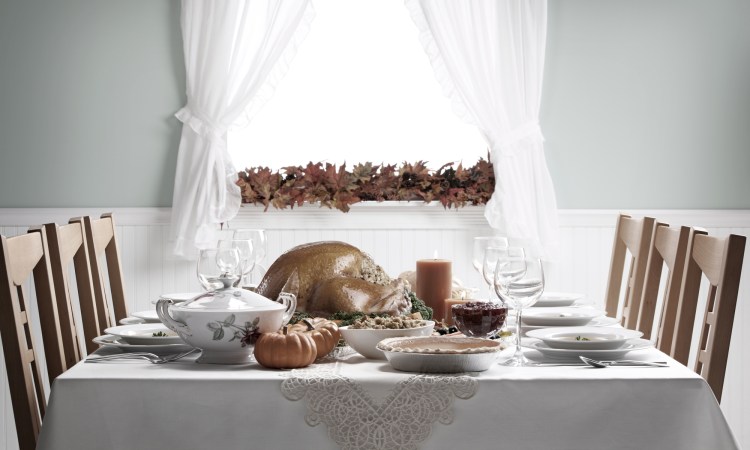
In January 2020, a new advice column from New York City psychologist Guy Winch, who has given two beautifully thoughtful and helpful TED Talks and written one TED book, will appear on TED.com. Called “Dear Guy,” the column will consist of Guy’s answers to questions from readers.
As we’re preparing to publish it, we’ve realized this: We need questions for him to answer! So we’ve decided to offer you this preview of his column. After you read it, please send your problems — about your relationships, your job, your passions, your life — to dearguy@ted.com
Dear Guy,
I have a confession to make: I kind of dread Thanksgiving. I am a single woman, and my nuclear family consists of just two other people: my father and my sister, who’s also single. (My mother passed away 20 years ago; my dad has a longtime girlfriend but we don’t celebrate holidays with her as she has her own children to celebrate with.)
Our Thanksgiving dinners most often consist of we three, with a relative or family friend or two. That’s all. When I hear people talking about the crowds coming to their houses for Thanksgiving and having to get extra tables and chairs to fit everyone, I’m envious and — I’ll admit — a bit lonely.
Aside from Thanksgiving, I worry about having such a small family. It makes me feel tiny and defenseless in the face of the world. Yes, I have friends who are as emotionally close to me as my family members, but I’m painfully struck by the fact that I have so few direct relations. And I worry — probably an inordinate amount — about what will happen to me when they die, something that’s going to happen, sooner or later.
Signed,
Three’s not enough for Thanksgiving
Dear Three,
Much as accountants’ busiest time of year is tax season in April, we therapists see our practices overflow in November and December. Why? ‘Tis the season of family gatherings.
These gatherings, which bring together people who rarely see each other, can be lovely and heartwarming — emphasis on “can be.” They can also be laden with tension and cause fully grown adults to regress so deeply into their teenage stereotypes that they will be tempted to check the mirror to make sure their acne hasn’t returned.
Squabbles aside, some people find comfort in large holiday gatherings, while others, like you, Three, find their smaller ones to evoke an ache of sorts — a recognition that your tribe is small and will be gone someday. Of course, you feel “tiny and defenseless” and lonely at the thought. Who wouldn’t?
Yet your letter reveals a perceptual bias that many of us have but one which contradicts the reality of life in the 21st century. For many — especially singles but for those with partners too — the people to whom we are most connected on a daily basis, those who fulfill our social, emotional and sexual needs — are not our family members. They’re our friends. Our nuclear family members might claim that title but not that function. In the real day to day, it’s our friends who form the real members of our tribe.
In the most recent US Census, 27 percent of all households were single-person households. More and more of us need and have close functional relationships with non-family members that fulfill the roles once fulfilled almost exclusively by members of one’s nuclear or extended family. Researchers have coined different names for this phenomenon, including “Family-of-Choice”, “Intentional Family” or “Personal-Community”. But regardless of what we call this collection of bonds, the fact that they function as our de facto families means that we need to redefine what “family” means — to reconsider who our family is so it reflects the actual realities of our lives.
Such definitions matter, Three, because when you write, “I have friends who are as emotionally close to me as my family,” you are essentially saying, “I have non-family members in my life that function as my family.” If that’s the case, then your perception of a family holiday like Thanksgiving has to change as well, because limiting it to nuclear family members is incongruous with the functional reality of who your “family” actually includes. In other words, your sister and your father are a part of a nuclear family unit within the much larger Three-Family.
I propose that you initiate a gathering that brings together the individuals, couples and smaller nuclear family units who are the functional members of Three-Family. Yours would be a new kind of celebration for a new kind of family, one focused on building a sense of community and togetherness. Now you may wonder: How does one make a large group of disparate individuals and smaller family units feel like one big tribe? Rituals.
Rituals are what define families and what create feelings of kinship among people, and enacting rituals during a holiday gathering has been shown to lead to better feelings of closeness and overall greater enjoyment for the participants. As part of your new Three-Family celebration, you should enlist your group to create rituals that represent the entire gathering and that can be enacted in future get-togethers.
I suggest that your first Three-Family gathering take place this January — because many people’s holiday plans for November and December are already set by now and because January is a time in which many of us could use some comfort and cheer. Your rituals can consist of anything you want; don’t feel restricted to repeating what you do with your nuclear family. What decorations will you use? What music or games will you play? What foods would you like to eat together?
At some point during the meal, you might ask each person to share an important or meaningful moment from the past year, or a wish or resolution for the upcoming year. Or, you could create an annual time capsule in which each person writes a goal, hope or message to their future self (to be opened at the next Three-Family gathering).
By having your first celebration in January, you’ll familiarize the people in your Three-Family group with each other and set the stage for them to consider joining your larger Thanksgiving gathering next year. Yes, some members of your Three-Family will no doubt have other obligations next Thanksgiving, but there are bound to be those who’d happily join your nuclear family and some who’d be thrilled to have an excuse to ditch their traditional feuds and squabbles to share their holiday with your family. Alternatively, you may decide you’d like to have two (or more) Three-Family gatherings under your collective belt before you all enjoy Thanksgiving together — it’s up to you to decide.
Three, you’re right — your nuclear family members will die someday. But as sad as that reality is, it doesn’t mean you’ll be left without family. It means that you’ll then count among your family members only those who care about you enough to already function in that capacity, who want to be your family, who choose to be with you, and who are in your life not because of genetics, marriage or duty, but because of love.
Got life problems that you could use help with? Send them to dearguy@ted.com. Your questions should be between 200-250 words long, and please provide Guy with enough detail and context about you and your life to guide him in addressing your situation.











